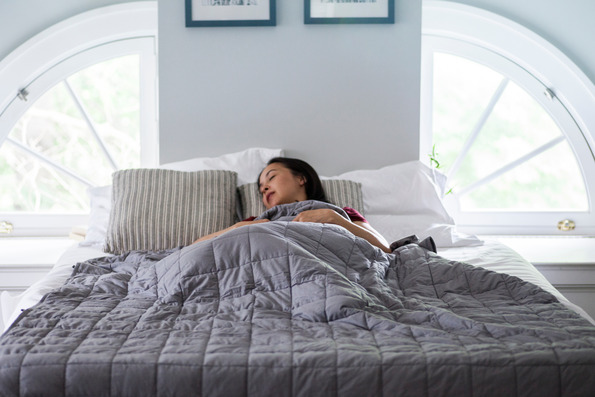
Do you suffer from sleep apnea? If so, you know how disruptive it can be to your nightly rest. But did you know that weighted blankets could offer some relief? Some research suggests that they could be particularly helpful for those with obstructive sleep apnea. Read on to learn how these cozy blankets can help you catch those much-needed Z’s!
What Is Sleep Apnea?
First things first, what exactly is sleep apnea? Well, it’s a common breathing disorder where your airway gets blocked during sleep, often by your tongue or soft tissues at the back of your mouth. These obstructions can lead to frequent pauses in breathing, disrupting your sleep cycle and causing oxygen depletion in your body. If left untreated, sleep apnea can even lead to serious health complications.
How Does a Weighted Blanket Help?
Weighted blankets are like a warm, comforting hug that can help you drift off into dreamland. They’re designed with an interior lining that evenly distributes weight, providing a gentle pressure across your body. These blankets come in various weights, typically ranging from 4 to 30 pounds.
Studies suggest that the optimal weight for relaxation and sleep is between 12 to 15 pounds. This weight range doesn’t exert too much pressure or heat, ensuring it won’t disturb your sleep. Plus, as you snuggle up under the weighted blanket, your body releases oxytocin, a feel-good hormone that can help alleviate sleep-disrupting issues like restless leg syndrome.
Plus, weighted blankets offer more than just relief for sleep apnea. They’re known to combat insomnia, reduce stress, and enhance overall comfort. However, it’s important to note that while they’re safe for those using CPAP machines or oral appliances for sleep apnea, they’re not recommended for individuals with untreated sleep apnea.
Choosing the Right Weighted Blanket
Selecting the perfect weighted blanket is crucial for sleep-enhancing benefits. As a general rule, adults should opt for a blanket that’s around 10% of their body weight. For example, if you weigh 160 pounds, aim for a 16-pound blanket. Health experts often recommend going for a heavier option to maximize the blanket’s effectiveness.
Managing Sleep Apnea
While a weighted blanket can promote peaceful sleep, keep in mind that it’s not a substitute for sleep apnea therapy.
The ideal treatment for sleep apnea is Continuous Positive Airway Pressure (CPAP) therapy, which involves wearing a mask that delivers pressurized air to keep your airway open during sleep. Alternatively, those with mild-to-moderate sleep apnea may find relief with an oral appliance. These devices reposition your tongue and jaw to prevent airway obstruction while you sleep.
About the Author
With over two decades of dentistry experience under his belt, Dr. Jeff Rodgers specializes in addressing snoring, sleep apnea, and related sleep disorders. His dedication to this field is evident through extensive advanced training, leading to his recognition as a Diplomate by both the American Academy of Dental Sleep Medicine and the American Sleep and Breathing Academy. If you’re worried about sleep apnea, you can schedule a consultation via his website or call (770) 394-4310.
